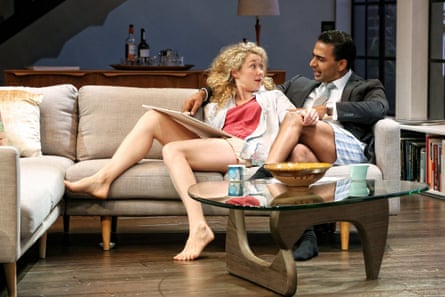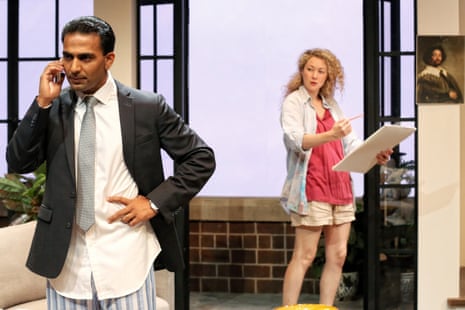US writer Ayad Akhtar’s 2013 Pulitzer prize-winning play is taut, engrossing and powerful; an examination of our post-9/11 western world, played out in one tastefully decorated, spacious Manhattan apartment.
Into it steps Amir Kapoor (Sachin Joab), a US-born, Muslim-raised merger and acquisitions specialist in a Jewish law firm. Kapoor, an apostate, has rejected Islam as a “backward way of thinking and being” and is attempting to supplant it with American capitalism – but he struggles to fully unburden himself of the cultural weight wrought by Islamic extremism.
His artist wife, Emily (Sophie Ross), is a WASP, who constantly contradicts his criticism of the faith and insists there is “beauty and wisdom in the Islamic tradition”.
She says Muslims gave the world “visual perspective” but her paintings draw on Islamic art in what the late Palestinian intellectual Edward Said would likely have registered as Orientalism: the patronising western raid of eastern culture. Her artistic and philosophical homage is further tainted by a profit motive: her career is taking off.

While Emily embraces Islamic tradition, Amir is trying to bury it. He changed his Pakistani former name, Abdullah, to a common Punjabi name, acquiring a new social security number to hide the switch. “Kapoor. Where in India is that name from?” asks his law firm colleague Jory (Paula Arundell), trying to pin his origins down.
No one needs to lecture Jory about racial profiling; like Amir, her otherness is written on her skin. An African-American, her advancement at the law firm has been predicated on favouring order over justice, she says – inferring that the civil rights fight of her forebears is, for her, an anachronism.
Jory’s husband, Isaac (Glenn Hazeldine), is a curator at the Whitney; he’s Jewish but critical of modern Israel’s military actions and a pragmatist when it comes to eating pork.
The work broadly asks whether Americans – or, by extension, members of other western societies – must renounce their “other” cultural identities to gain mainstream acceptance. Its concerns are as specific to Australia as they are to the US, as attacks from Pakistan to Paris to Brussels make locally born Muslims the target of suspicion, and reduce debate to simplistic binaries: patriotism versus tribalism. Disgraced will be subject to a separate production in Melbourne and Brisbane later this year, and its Australian premiere – in the hands of director Sarah Goodes – sets a high benchmark.
Elizabeth Gadsby’s gorgeous set design in the intimate Wharf 1 theatre envelops the audience, subtly assisted by Damien Cooper’s lighting and composer Steve Francis’s dramatic segues between scenes; it feels as though we too are inside this Upper East Side home.

At one point, through a gauze curtain upstairs, we see the outline of Emily undressing: a clever allusion to Amir’s broad-brush claim that Muslims are prejudiced against white women and their propensity to disrobe.
Akhtar’s script confronts us with the fragile nature of tolerance. He winds the dramatic strings tight through the revelation that Amir – a one-time public defender – has represented an imam accused of raising funds for terrorism, which brings fear and bigotry to the fore. This yields an explosive admission: Amir felt a fleeting sense of pride when the Twin Towers fell. Amir is a “closet jihadist”, Isaac spits, as baldly as Jory sees the veil as evil, an erasure of the face.
Joab makes a charismatic Amir, while Sophie Ross is poignant as she emotes Emily’s failings (through an accent that needs a little refining). On the whole, their work together reads as truthful, although the couple’s rhythm starts a little off-kilter and a very physical later scene does not play out convincingly.
Paula Arundell makes a tasty meal of Jory’s self-possession while Glenn Hazeldine soundly affixes a poker face to Isaac, until the art curator comically erupts.
The quickly cumulative revelations and denunciations have a televisual effect, in the sense of the best episodic drama where plot points suddenly – if implausibly – pile up. Akhtar so effectively drives this dramatic density that I found myself surprised the play had ended just before the 90-minute mark.
I wanted the story to continue, yet I felt satisfied. Although I did wonder if some Muslim audience members would feel very differently, witnessing Amir’s wholly negative reading of the Quran and inevitable psychological collapse as everyone, including himself, kicks away at his foundations.
- Disgraced is at Wharf 1 Theatre in Walsh Bay, Sydney until 4 June.

Comments (…)
Sign in or create your Guardian account to join the discussion